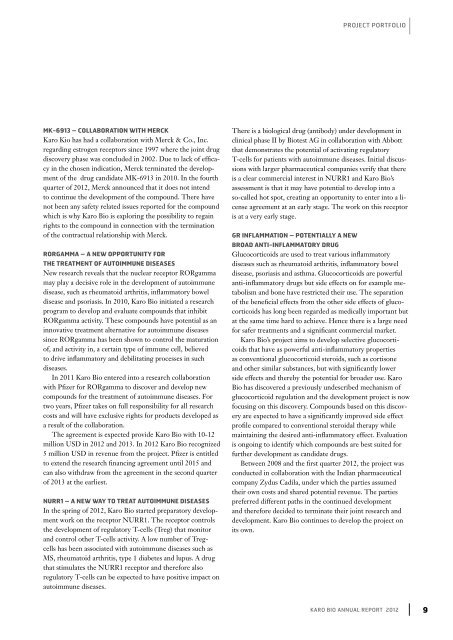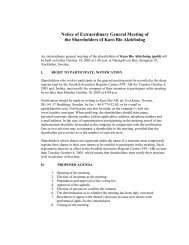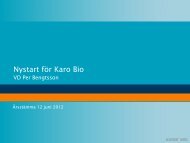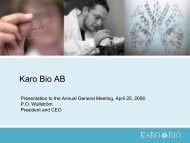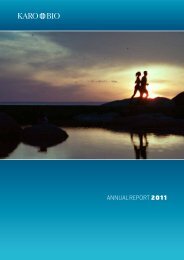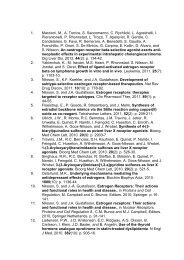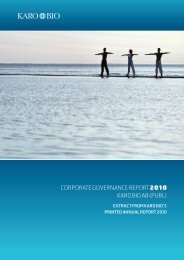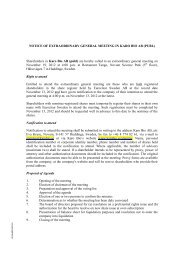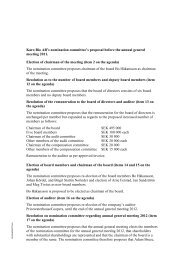Annual Report 2012.pdf - Karo Bio
Annual Report 2012.pdf - Karo Bio
Annual Report 2012.pdf - Karo Bio
Create successful ePaper yourself
Turn your PDF publications into a flip-book with our unique Google optimized e-Paper software.
Project portfolio<br />
MK-6913 – collaboration with Merck<br />
<strong>Karo</strong> Kio has had a collaboration with Merck & Co., Inc.<br />
regarding estrogen receptors since 1997 where the joint drug<br />
discovery phase was concluded in 2002. Due to lack of efficacy<br />
in the chosen indication, Merck terminated the development<br />
of the drug candidate MK-6913 in 2010. In the fourth<br />
quarter of 2012, Merck announced that it does not intend<br />
to continue the development of the compound. There have<br />
not been any safety related issues reported for the compound<br />
which is why <strong>Karo</strong> <strong>Bio</strong> is exploring the possibility to regain<br />
rights to the compound in connection with the termination<br />
of the contractual relationship with Merck.<br />
RORgamma – a new opportunity for<br />
the treatment of autoimmune diseases<br />
New research reveals that the nuclear receptor RORgamma<br />
may play a decisive role in the development of autoimmune<br />
disease, such as rheumatoid arthritis, inflammatory bowel<br />
disease and psoriasis. In 2010, <strong>Karo</strong> <strong>Bio</strong> initiated a research<br />
program to develop and evaluate compounds that inhibit<br />
RORgamma activity. These compounds have potential as an<br />
innovative treatment alternative for autoimmune diseases<br />
since RORgamma has been shown to control the maturation<br />
of, and activity in, a certain type of immune cell, believed<br />
to drive inflammatory and debilitating processes in such<br />
diseases.<br />
In 2011 <strong>Karo</strong> <strong>Bio</strong> entered into a research collaboration<br />
with Pfizer for RORgamma to discover and develop new<br />
compounds for the treatment of autoimmune diseases. For<br />
two years, Pfizer takes on full responsibility for all research<br />
costs and will have exclusive rights for products developed as<br />
a result of the collaboration.<br />
The agreement is expected provide <strong>Karo</strong> <strong>Bio</strong> with 10-12<br />
million USD in 2012 and 2013. In 2012 <strong>Karo</strong> <strong>Bio</strong> recognized<br />
5 million USD in revenue from the project. Pfizer is entitled<br />
to extend the research financing agreement until 2015 and<br />
can also withdraw from the agreement in the second quarter<br />
of 2013 at the earliest.<br />
NURR1 – a new way to treat autoimmune diseases<br />
In the spring of 2012, <strong>Karo</strong> <strong>Bio</strong> started preparatory development<br />
work on the receptor NURR1. The receptor controls<br />
the development of regulatory T-cells (Treg) that monitor<br />
and control other T-cells activity. A low number of Tregcells<br />
has been associated with autoimmune diseases such as<br />
MS, rheumatoid arthritis, type 1 diabetes and lupus. A drug<br />
that stimulates the NURR1 receptor and therefore also<br />
regulatory T-cells can be expected to have positive impact on<br />
autoimmune diseases.<br />
There is a biological drug (antibody) under development in<br />
clinical phase II by <strong>Bio</strong>test AG in collaboration with Abbott<br />
that demonstrates the potential of activating regulatory<br />
T-cells for patients with autoimmune diseases. Initial discussions<br />
with larger pharmaceutical companies verify that there<br />
is a clear commercial interest in NURR1 and <strong>Karo</strong> <strong>Bio</strong>’s<br />
assessment is that it may have potential to develop into a<br />
so-called hot spot, creating an opportunity to enter into a license<br />
agreement at an early stage. The work on this receptor<br />
is at a very early stage.<br />
GR inflammation – potentially a new<br />
broad anti-inflammatory drug<br />
Glucocorticoids are used to treat various inflammatory<br />
diseases such as rheumatoid arthritis, inflammatory bowel<br />
disease, psoriasis and asthma. Glucocorticoids are powerful<br />
anti-inflammatory drugs but side effects on for example metabolism<br />
and bone have restricted their use. The separation<br />
of the beneficial effects from the other side effects of glucocorticoids<br />
has long been regarded as medically important but<br />
at the same time hard to achieve. Hence there is a large need<br />
for safer treatments and a significant commercial market.<br />
<strong>Karo</strong> <strong>Bio</strong>’s project aims to develop selective glucocorticoids<br />
that have as powerful anti-inflammatory properties<br />
as conventional glucocorticoid steroids, such as cortisone<br />
and other similar substances, but with significantly lower<br />
side effects and thereby the potential for broader use. <strong>Karo</strong><br />
<strong>Bio</strong> has discovered a previously undescribed mechanism of<br />
glucocorticoid regulation and the development project is now<br />
focusing on this discovery. Compounds based on this discovery<br />
are expected to have a significantly improved side effect<br />
profile compared to conventional steroidal therapy while<br />
maintaining the desired anti-inflammatory effect. Evaluation<br />
is ongoing to identify which compounds are best suited for<br />
further development as candidate drugs.<br />
Between 2008 and the first quarter 2012, the project was<br />
conducted in collaboration with the Indian pharmaceutical<br />
company Zydus Cadila, under which the parties assumed<br />
their own costs and shared potential revenue. The parties<br />
preferred different paths in the continued development<br />
and therefore decided to terminate their joint research and<br />
development. <strong>Karo</strong> <strong>Bio</strong> continues to develop the project on<br />
its own.<br />
KARO BIO <strong>Annual</strong> <strong>Report</strong> 2012 9


